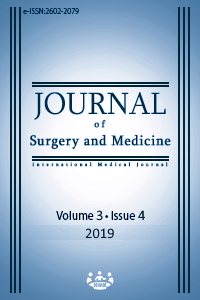Factors affecting compliance of intraoperative frozen and final histopathology in borderline ovarian tumors: Retrospective cohort study
Keywords:
Borderline ovarian tumor, Frozen section, ConcordanceAbstract
Aim: Frozen sections (FS) are commonly used in the course of adnexal masses operations, and it assist to select the most appropriate surgical treatment modalities in addition to intraoperative management. In this study, we aimed to investigate the effect of the demographic and obstetric characteristics as well as biochemical findings with the consistency of intraoperative FS findings with the final histopathological diagnosis in patients with borderline ovarian tumors (BOT).
Methods: This retrospective study included a total of 31 BOT patients who underwent intraoperative frozen histopathological study. The study population was divided into two groups; group 1 consisted of patients who had a positive concordance between the findings of intraoperative FS and the final histopathology, while the patients included in the group 2 had a negative concordance between the results of two examinations. We compared two groups in terms of baseline characteristics, tumor markers, tumor size, bilaterality, menopausal status and presence of ascites.
Results: There were no statistically significant differences between the two groups in terms of age, body-mass index, tumor markers (CA125, CA19-9, CEA, AFP, CA15-3, β-HCG) and tumor size (P=0.74, P=0.55, P=0.87, P=0.55, P=0.24, P=0.33, P=0.70, P=0.32 and P=0.98, respectively). Also, the presence of bilateral BOT and ascites as well as menopausal status were not different between both groups (P=0.12, P=0.60, P=0.70, respectively).
Conclusion: Based on the study findings, we noted that patients whether had concordance or discordance with the findings of intraoperative frozen sections and the final histopathology did not differ in terms of baseline characteristics and tumor markers.
Downloads
References
Ureyen I, Turan T, Cirik DA, Tasci T, Boran N, Bulbul D, et al. Frozen section in borderline ovarian tumors: is it reliable? Eur J Obstet Gynecol Reprod Biol. 2014;181:115-8.
Messalli EM, Grauso F, Balbi G, Napolitano A, Seguino E, Torella M. Borderline ovarian tumors: features and controversial aspects. Eur J Obstet Gynecol Reprod Biol. 2013;167:86-9.
Morice P, Uzan C, Fauvet R, Gouy S, Duvillard P, Darai E. Borderline ovarian tumour: pathological diagnostic dilemma and risk factors for invasive or lethal recurrence. Lancet Oncol. 2012;13:e103-15.
Hart WR. Borderline epithelial tumors of the ovary. Mod Pathol. 2005;18:s33-50.
Ren J, Peng Z, Yang K. A clinicopathologic multivariate analysis affecting recurrence of borderline ovarian tumors. Gynecol Oncol. 2008;110:162-7.
Kayikçioglu F, Pata O, Cengiz S, Tulunay G, Boran N, Yalvaç S, et al. Accuracy of frozen section diagnosis in borderline ovarian malignancy. Gynecol Obstet Invest. 2000;49:187-9.
Gizzo S, Berretta R, Di Gangi S, Guido M, Zanni GC, Franceschetti I, et al. Borderline ovarian tumors and diagnostic dilemma of intraoperative diagnosis: could preoperative He4 assay and ROMA score assessment increase the frozen section accuracy? A multicenter case-control study. Biomed Res Int. 2014;2014:803598.
Tempfer CB, Polterauer S, Bentz EK, Reinthaller A, Hefler LA. Accuracy of intraoperative frozen section analysis in borderline tumors of the ovary: a retrospective analysis of 96 cases and review of the literature. Gynecol Oncol. 2007;107:248-52.
Kim, JH, Kim TJ, Park YG, Lee SH, Lee CW, Song MJ, et al. Clinical analysis of intra-operative frozen section proven borderline tumors of the ovary. J Gynecol Oncol. 2009;20:176-80.
Gramlich T, Austin RM, Lutz M. Histologic sampling requirements in ovarian carcinoma: a review of 51 tumors. Gynecol Oncol. 1990;38:249-56.
Pongsuvareeyakul T, Khunamornpong S, Settakorn J, Sukpan K, Suprasert P, Siriaunkgul S. Accuracy of frozen-section diagnosis of ovarian mucinous tumors. Int J Gynecol Cancer. 2012;22:400-6.
Tangjitgamol, S, Jesadapatrakul S, Manusirivithaya, S, Sheanakul C. Accuracy of frozen section in diagnosis of ovarian mass. Int J Gynecol Cancer. 2004;14:212-9.
De Decker K, Speth, S, Ter Brugge, HG, Bart J, Massuger LFAG, Kleppe M, et al. Staging procedures in patients with mucinous borderline tumors of the ovary do not reveal peritoneal or omental disease. Gynecol Oncol. 2017;144:285-9.
Downloads
- 1039 1549
Published
Issue
Section
How to Cite
License
Copyright (c) 2019 Yakup Baykuş, Rulin Deniz, Ebru Çelik Kavak
This work is licensed under a Creative Commons Attribution-NonCommercial-NoDerivatives 4.0 International License.
















